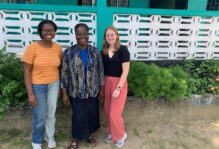Mining For Ideas – Reflections on WMGIC VIII
By: Elisabeth Nielsen ’27 and Dorothy Gao ’24
In April, 20+ teams with over 85 participants from 5 countries participated in the eighth annual William & Mary Global Innovation Challenge (WMGIC). WMGIC is a 24 hour hack-a-thon style case competition, where teams are tasked with solving an international development issue in a collaborative environment, working with industry experts who mentor them as they develop their solution. This year’s challenge was, “Given the historic relationship between Zambia and China on land mining projects, how should Zambia navigate the future of traditional and innovative mining practices in order to ensure the improved welfare for citizens and lessened environmental impact?”
We want to extend thanks to our sponsors: the Institute for Integrative Conservation, the Global Research Institute, the Career Development & Professional Engagement, and the Whole of Government Center for Excellence. Because of their generous support, we were able to host four streams: two streams focused on governance solutions, one stream concentrating on business consulting, and another stream looking at the impact of technology. Recently, we caught up with three of this year’s winning teams to hear what they had to say about the competition and learn about their solutions.
The Business Consulting Stream Winner was Super W&M (Members: Flora Wu ’25, Cindy Zhang ’26, Violet Shi ’26, Ella Pan ’26; William & Mary). Their solution identified CATL as their client, which is a Chinese company that specializes in EV battery manufacturing with a dominating market share in China. Given Zambia’s rich deposits of cobalt, nickel, and manganese, which are crucial to battery manufacturing, they proposed a vertical integration strategy that began with acquiring small and medium-sized mining companies and featured a shared-financing agreement, sustainable operations, and workforce development.
They recommended that CATL pursue a shared-financing agreement with the Zambian government. This collaboration would offer cost-sharing, tax benefits, and a strong position in Zambia’s mining sector, aligning CATL’s goals with Zambia’s economic priorities. The project integrated renewable energy and advanced waste management in mining operations to promote environmental responsibility, social acceptance, and long-term cooperation with local communities. They also aligned with the client’s vision by implementing training programs for the local mine workers to enhance their skills, reduce operational costs, and improve CATL’s market access and brand reputation.
This approach would secure a stable supply chain of raw materials for CATL, foster local employment, and promote sustainable mining practices. Partnering with the Zambian government would also ensure community involvement and support Zambia’s economic independence, positioning the client at the forefront of sustainable industrial practices.
The Governance I Stream Winner was Team Brescia (Members: Elkana Mongare ’27, Nevaeh DeArmond ’24, Emilee Clark ’24, Juan Tavera Moreno ’24; Brescia University). As an external consultant agency, they proposed a policy to the Zambian government in which they suggested furthering partnerships regionally, specifically with the Democratic Republic of Congo (DRC), another major mineral exporter. They posited that regional partnerships would allow for variety in what is being mined.
Opening the mining industry to minerals like cobalt would provide more jobs to Zambian citizens who are the victims of corruption and mistreatment by mining organizations. This would be supported through the implementation of specialization and solution mining education training programs which would be created with the support of the Common Market for Eastern and Southern Africa (COMESA) as an International organization partner.
Diversifying the mining industry would take reliance off a single mineral or a select few minerals and make the country more stable than just relying on one mineral, such as copper. In addition to diversifying the industry, this solution would create better relations with regional partners to help pay off the debt to Chinese partnerships and corporations to reduce reliance.
The Technology Stream Winner was Team Goza (Members: Taewon Kwon ’25, William & Mary; Dohun Kwon, Northeastern ’25; Jaemin Baek, Cooper Union ’24). Their solution was an integrated data analytics platform that would merge blockchain technology and drone imaging to offer a comprehensive solution, one which would ensure transparency, traceability, and sustainability across the mining supply chain.
The platform would incorporate AI algorithms that take the data input from the blockchain system and drone technology to provide stakeholders with actionable intelligence that would ultimately drive sustainable mining practices that would benefit Zambia economically and environmentally. Not only would this solution assist Zambia’s national issues, but it would also benefit the working communities within the nation by ensuring that mineral mining abides by ethical standards and regulatory compliances.
The WMGIC staff congratulates all winners of the WMGIC VIII Flagship competition and extends a warm thank you to the competition’s judges, mentors, and core sponsors. We were glad to host so many participants again this year to practice innovation, network with experts, and develop the skills necessary for a successful career in the international sector. After the competition, Team Goza said, “Participating in WMGIC was an incredibly enriching experience. It not only challenged us to apply our skills in real-world scenarios but also provided a platform to network with industry leaders and peers. The insights gained from the expert feedback and the creative atmosphere were truly invaluable. We highly recommend WMGIC to anyone looking to enhance their business acumen and innovate in their field.”
To learn more about WMGIC VIII and watch the winning presentations, visit the WMGIC VIII showcase playlist page.




No comments.